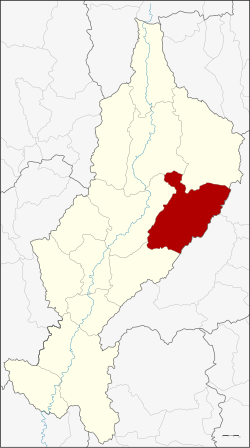Mae Mo district
Mae Mo
แม่เมาะ | |
|---|---|
 Huai Rak Mai, a railway halt on Northern Railway Line, Mae Mo, Mae Mo District | |
 District location in Lampang province | |
| Coordinates: 18°16′30″N 99°39′0″E / 18.27500°N 99.65000°E / 18.27500; 99.65000 | |
| Country | Thailand |
| Province | Lampang |
| Seat | Mae Mo |
| Area | |
| • Total | 959.2 km2 (370.3 sq mi) |
| Population (2005) | |
| • Total | 38,768 |
| • Density | 40.4/km2 (105/sq mi) |
| Time zone | UTC+7 (ICT) |
| Postal code | 52220 |
| Geocode | 5202 |
Mae Mo (Thai: แม่เมาะ, pronounced [mɛ̂ː mɔ́ʔ]) or Mae Moh is a district (amphoe) in the eastern part of Lampang province, northern Thailand.
Geography
Neighboring districts are (from the south clockwise): Mae Tha, Mueang Lampang, Chae Hom and Ngao of Lampang Province, Song and Long of Phrae province.
The Phi Pan Nam Mountains dominate the landscape of the district. Mae Mo is about 20 km (12 mi) from Mueang Lampang District.
History
The minor district (king amphoe) was created on 15 April 1976, when three tambons, Ban Dong, Chang Nuea, and Na Sak, were split off from Mueang Lampang district.[1] It was upgraded to a full district on 16 July 1984.[2]
Administration
The district is divided into five sub-districts (tambons), which are further subdivided into 37 villages (mubans). There are no municipal (thesabans). There are five tambon administrative organizations (TAO).
| No. | Name | Thai name | Villages | Pop. | |
|---|---|---|---|---|---|
| 1. | Ban Dong | บ้านดง | 8 | 4,677 | |
| 2. | Na Sak | นาสัก | 8 | 6,261 | |
| 3. | Chang Nuea | จางเหนือ | 6 | 5,336 | |
| 4. | Mae Mo | แม่เมาะ | 8 | 16,589 | |
| 5. | Sop Pat | สบป้าด | 7 | 5,905 |
Economy
Mae Mo is the site of a 2,400 MW lignite-fueled power plant run by the Electricity Generating Authority of Thailand (EGAT),[3] and the lignite mine that powers it.[4][5] The plant has been the target of a series of lawsuits brought by locals who claim that the lignite mining operation and the burning of lignite fuel by EGAT has negatively impacted the environment and the health of those living in the vicinity. A 12-year fight by villagers for compensation for damages ended in victory for the plaintiffs in February 2015. The Supreme Administrative Court in Chiang Mai Province upheld a ruling by the Chiang Mai Administrative Court in 2005. The court handed down a verdict ordering EGAT to pay compensation to 131 plaintiffs, some of them deceased. Plant victims were awarded between 20,000 and 240,000 baht each, commensurate with their suffering. The total amounts to 25 million baht plus 7.5 percent interest.[6]
Several days earlier, the court had ordered EGAT to return its Mae Mo golf course, adjacent to the open pit lignite mine, to woodland in order to help clean up the air pollution caused by EGAT's Mae Mo operations.[7]
Coal-fired power plants such as Mae Mo can release up to 150 million tonnes of CO2 over their design life of 20–25 years, according to Greenpeace-Thailand.[8]
Excavations at the open-pit lignite mine revealed what is thought to be the world's largest freshwater snail terrace. The terrace, 12 metres deep and covering 43 rai (6.9 ha; 17 acres), is up to 13 million years old. Attempts by organizations to preserve the site were dashed in September 2018 when the Supreme Administrative Court overturned a lower court ruling protecting the site. EGAT claimed that the cost of preservation would amount to 132.5 billion baht in lost revenue.[9]
EGAT began the decommissioning of the Mae Moh lignite mine, the largest coal mine in Thailand, in 2019.[10]
References
- ^ ประกาศกระทรวงมหาดไทย เรื่อง แบ่งท้องที่อำเภอเมืองลำปาง จังหวัดลำปาง ตั้งเป็นกิ่งอำเภอแม่เมาะ (PDF). Royal Gazette (in Thai). 93 (58 ง): 856. April 13, 1976. Archived from the original (PDF) on February 1, 2012. Retrieved October 23, 2007.
- ^ พระราชกฤษฎีกาตั้งอำเภอลานกระบือ อำเภอดงหลวง อำเภอทรายมูล อำเภอแม่เมาะ และอำเภอบัวเชด พ.ศ. ๒๕๒๗ (PDF). Royal Gazette (in Thai). 101 (96 ก special): 10–12. July 16, 1984. Archived from the original (PDF) on February 1, 2012.
- ^ "Mae Moh Power Plant". Electricity Generating Authority of Thailand (EGAT). Retrieved 28 July 2015.
- ^ "Mae Moh Lignite Mine". Electricity Generating Authority of Thailand (EGAT). Retrieved 14 September 2018.
- ^ "Mae Moh Mine". Tourism Authority of Thailand (TAT). Retrieved 14 September 2018.
- ^ Sattha, Cheewin (2015-02-15). "Victory for Mae Moh victims". Bangkok Post. Retrieved 28 July 2015.
- ^ "Mae Moh golf course to be destroyed". Bangkok Post. 2015-02-11. Retrieved 28 July 2015.
- ^ Rujivanarom, Pratch (26 November 2016). "Experts urge people to help climate-change mitigation as big goals loom". The Nation. Retrieved 26 November 2016.
- ^ Saengpassa, Chularat (14 September 2018). "Top court invalidates ruling on fossil terrace". The Nation. Retrieved 14 September 2018.
- ^ Praiwan, Yuthana (26 October 2019). "Egat prepares to shut down Mae Moh mine". Bangkok Post. Retrieved 26 October 2019.
External links
- amphoe.com